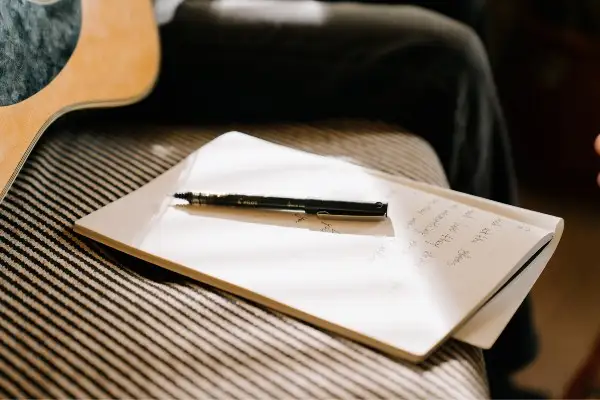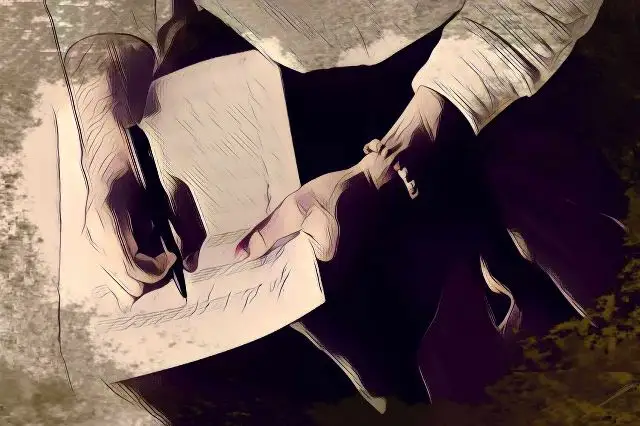The cornerstone of any memorable song is excellent lyrics. Most songwriters are self-taught, but there are some tricks of the trade that can help you incorporate amazing lyrics into your own music from the get-go, even if you haven't written songs in the past.
Below, we'll showcase some of the best lyric writing tips to help you strike inspiration and kick of your journey as a songwriter. Whether you're a novice or a budding songwriter looking for new ideas to improve your sound, these tips are designed to pull amazing ideas out of your art.
Key Elements of Song Lyrics

It's challenging to write a great song if you don't know the components that go into strong song lyrics. Here are the key elements that separate song lyrics from poetry:
Rhyme Scheme
Song lyrics tend to follow a specific rhyme scheme. For instance, in an AABB rhyme scheme, the ending word of the first line will rhyme with the ending word of the second line. Then, the third line's last word will rhyme with the last word at the end of the four lines. You can hear this rhyme scheme at work in songs like Daniel by Elton John:
This rhyme scheme essentially equates to a group of couplets, or rhyming line pairs. This is a poetry term, though it can be applied musically. It's key to understand lyrics are essentially poetry, just with a more defined rhyme scheme and melodic tones applied to the words. There are more rhyme schemes, like AAAA (monorhyme), ABAB, and rhyming words can change over the course of a song.
For instance, the verses of a song may have one rhyme scheme, while the chorus holds another. Rhymes make it easier for listeners to remember the lyrical content and make a song catchier. Outside of perfect rhyme, you may also find internal rhyme and assonance sprinkled across a song. While you're building out a rhyming scheme, there is no shame pulling out a rhyming dictionary like RhymeZone.com, for example.
Start with the right word for one line, and then use a rhyming dictionary to help you continue that idea within a common song structure.
Emotional Depth
Better lyrics come from honest, emotional depth. Music is a refuge for many listeners, so the more vulnerable you can be upfront in your lyrics, the more likely you are to connect quickly with an audience. Putting your heart on your sleeve in a song understandably feels a bit intimidating when you're just starting out as a songwriter, but your potential to connect to those you haven't meant in the past makes the risk worth taking.
Melodic Phrasing
The melody is arguably just as important as the lyrics and makes it much easier for people to remember your song upon first listen. Think of how you're phrasing each particular line of music in your songs. Should your line be performed staccato or elongated? How does this tie into the emotional meaning behind your verse or chorus? Your melodic phrasing should be optimized for catchiness, clarity, and most importantly, thematic sense with what you're trying to express.
A great example of phrasing contrast is Never Really Over by Katy Perry. Listen to the difference between the longer, calmer phrases in the verse to the short, choppy phrasing in the chorus:
Narrative Elements and Imagery
Remember as you put together random words you're ultimately painting a story. The more vivid imagery you can use to convey your messaging to your listeners, the better. Lean on literary devices like metaphor, hyperbole, and idioms to help you convey your story in a concise way that relates directly to the audience.
8 Tips to Write Lyrics
When you're learning how to write a song, crafting your own lyrics is the first piece of the puzzle. Here are some great tips to help you translate your stories into a melodic, clear idea:
1. Be Honest
Many times, our own expectations of what a song could be clouding our creative process. Whenever you're finding yourself distracted by what you think your first draft should sound like, try to revert back to being honest. As an exercise, act as though you're writing an honest letter to your subject without limitations.
This creative exercise will often bring you a foundation to kick off your song, if not a full set of lyrics to work off of.
2. Find and Switch Up New Ways To Start Writing
Every songwriter has their favorite way to start writing lyrics. Whether it's improvising over chord progressions, picking up an instrument of choice, or building out lyrics before plucking any notes, there isn't one right way to write lyrics. If you find yourself getting stuck, consider trying a different route than your usual method.
3. Know When to Bring out The Editor Hat
Lyric writing should come in stages. You need to let yourself brainstorm without self-imposed limitations, and trust that you'll bring out the editor hat later. Try to build your first complete draft and then let it sit for a couple of hours or a night before coming back in with an editor's perspective. Always edit your work in a separate document or project so that you have the option to refer back to prior song iterations. Segment your work in stages to promote productivity.
4. Show Don't Tell
As with any good piece of writing, your listener should get a sense of the story and the feelings behind it without being spoon-fed into your ideas. In Taylor Swift's All Too Well, the line "You call me up again just to break me like a promise" gives the listener a sense that trust has been broken and that the subject has been strung along, without having to spell out the exact details of what happened in the past. Think of the sites, sounds, memories, and backdrops you can create with the lyrics that help you set the scene while still trusting the listener with their own interpretation.
5. Study Your Favorite Artists
Your favorite songs serve as an excellent study of what good songwriting sounds like. Actively listen to how different songwriters move from the verse to the chorus. How does the melody shift? Does the rhythm change? Taking notes from what you've already heard can be very informative to your own writing process.
6. Use Creative Constraints
Sometimes, self-imposed limitations can make it a lot easier for you to start creating by giving you a specific working framework to start building your song in. For example, you might want to challenge yourself to make a song within a week, write a song based off of a random word, or build lyrics with a different rhyme scheme. Sometimes getting yourself to start is half the battle when it comes to writing lyrics.
7. Collaborate and Seek out Feedback
Listening to other musicians and casual listeners is an amazing way to improve your lyrical prowess. Experiment with building different kinds of songs with other musicians. For instance, if you aim for catchy pop songs, maybe opt to work with someone who writes sultry ballads. You can learn a lot by just listening and working with other artists.
8. Practice Makes Processes

Practice does not automatically make perfect, but it can build processes - in other words, the more you practice your songwriting muscles, the easier it will get to find your rhythm and voice as a musician. Start with small baby steps. For instance, maybe one day you write the first verse and the next you write the second verse. In time, you'll be able to write a song in one sitting.
When in doubt, allow yourself to work through your ideas, even if you don't think your song will make it to final release. Every time you sit down to write a song, you're making progress, regardless of how obvious it may be.
Lyric Writing Tips FAQ
Are you still struggling to write songs? Consider these commonly asked questions and answers to help you on your journey while writing music:
How can I make my song writing better?
You can make your songwriting better by continuing to practice your process and seek out feedback from your loved ones and other musicians. For example, one songwriter may improve their music with a better lyrical hook, others with more descriptive, incredible lyrics, and others still by cultivating a catchier cadence or rhyme scheme.
How to write a song for beginners?
In this guide, we'll give you several tips to help you build your first song. Ultimately, writing your first song equates to taking your own writing and putting it into a song structure with rhymes, memorable lyrics, and melodic hooks that stick in your listener's head.
What is the hardest part of songwriting?
The most challenging part of songwriting is not getting in your own way. Oftentimes, songwriters are far too judgemental towards their first draft, but the truth is that even megastars write poor songs from time to time. The more you practice the entire process, the more likely you are to improve upon your craft.
What makes you a good songwriter?
The best thing about songwriting is that it's entirely subjective-- what doesn't connect with one listener may strongly connect with another. In order to become a good songwriter, you need to learn the art of converting your life experiences into melodic and lyrical ideas that instantly create memorable moments for your listeners.
Learning how to write a song can be intimidating, but it is a skill that can be cultivated over time just like anything else. Hopefully, these tips make it easier for you to write lyrics that connect with listeners so that you can write great songs stemming from any situation. Happy songwriting!





